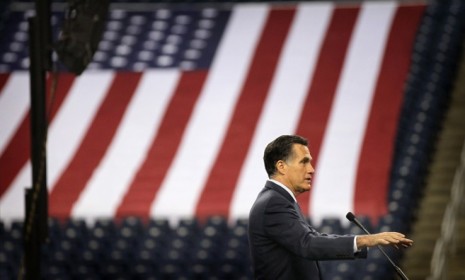The 'drawn-out primaries nightmare': What was the GOP thinking?
Republicans changed their rules to emulate the Democrats' epic, ultimately rewarding 2008 primary grudge match. Then the plan went terribly wrong

A free daily email with the biggest news stories of the day – and the best features from TheWeek.com
You are now subscribed
Your newsletter sign-up was successful
By this point in 2008, Republicans had already chosen Sen. John McCain as their presidential nominee, after a short battle that essentially ended on that year's Feb. 5 Super Tuesday primaries. On the Democratic side, though, the epic race between Sens. Barack Obama and Hillary Clinton was just getting started, and the long primary fight turned out to be an organizational bonanza for Team Obama, which set up campaign operations and excited supporters in just about every state. In 2010, a somewhat-envious Republican National Committee decided to change its nominating rules to match the Democrats'. "It seemed like such a good idea at the time," says Benjy Sarlin at Talking Points Memo, but instead of "their own version of Obama vs. Clinton," Republican have ended up in a "drawn-out primaries nightmare." A look at what went wrong:
What changes did the RNC make for 2012?
Party leaders actually wanted a drawn-out contest, so they pushed the nomination calendar back a month, with Iowa and New Hampshire scheduled to kick things off in February, and ordered all states that held their primaries or caucuses before April to divide up their delegates proportionally, instead of the far-more decisive winner-take-all model. Any state that bucked those rules would get half their delegates taken away.
The Week
Escape your echo chamber. Get the facts behind the news, plus analysis from multiple perspectives.

Sign up for The Week's Free Newsletters
From our morning news briefing to a weekly Good News Newsletter, get the best of The Week delivered directly to your inbox.
From our morning news briefing to a weekly Good News Newsletter, get the best of The Week delivered directly to your inbox.
Why did they want a long fight?
A long waltz to the nomination was supposed to prompt "excited conservatives to register to vote in droves, donate early and often to the candidates, and keep the attention solely focused on the GOP's message instead of the White House's bully pulpit," says TPM's Sarlin. Plus, Republicans wanted time "to properly vet all the candidates," former RNC Chairman Michael Steele tells MSNBC's Rachel Maddow, giving "the base a chance to have their voices heard in states that aren't Iowa and New Hampshire and the bigger states that play early."
How has that worked out for the GOP?
The early contests have winnowed the field down to four candidates, but now Mitt Romney, Rick Santorum, Newt Gingrich, and Ron Paul are embroiled in what promises to be a long, ugly, state-by-state fight. So far, GOP "turnout is down from 2008 levels in most states," says TPM's Sarlin. "Romney's favorability ratings have been dipping into dangerous levels, especially with independents," and his war chest is "dwindling fast" as he dumps money into attack ads to fend off challengers. Changing the rules "was the dumbest idea anybody ever had," Gov. Chris Christie (R-N.J.) tells Fox News. "You're running against an incumbent president who will not have a primary, so your idea is make ours longer so we can beat each other up longer?"
A free daily email with the biggest news stories of the day – and the best features from TheWeek.com
Why exactly did the new system fail?
RNC officials blame Florida and other states for flouting the rules by holding their primaries in January, pushing the whole calendar up a month, says Molly Ball at The Atlantic. Others, like Christie and RealClearPolitics' Sean Trende, blame the RNC's mandated delegate apportioning, which prevents any one candidate from building an insurmountable delegate lead. Still others blame the "terrible" slate of candidates, Ball says, or the rebellious GOP voters who are "so obsessed with ideological purity" that they won't "settle for Mr. Right Now," or the flood of super PAC cash that keeps zombie campaigns up and walking, or even the long string of high-profile debates. It's likely "a combination of all these factors," Ball says. "What most observers seem able to agree on, though, is that they wish it would be over soon."
So changing the rules was a mistake?
Not if you ask RNC officials. "The drama and the tough primary is a good thing for us," and any bad feelings will be long gone by the general election, RNC Chairman Reince Priebus tells CNN. "We put people to sleep in '08 with our nomination process, and I think it's laughable when I hear people claiming that we ought to put people to sleep again this time around." I guess "generals always fight the last war," University of Virginia's Larry Sabato tells TPM. Running against an incumbent is much different than 2008's open election, and "if ever there was a case when the out-of-power party would have been helped by a quick, painless nomination of a strong challenger, it's 2012. No such luck for the GOP."
Sources: The Atlantic, The Hill, Huffington Post, Newsmax, Politico, RealClearPolitics, Talking Points Memo (2)